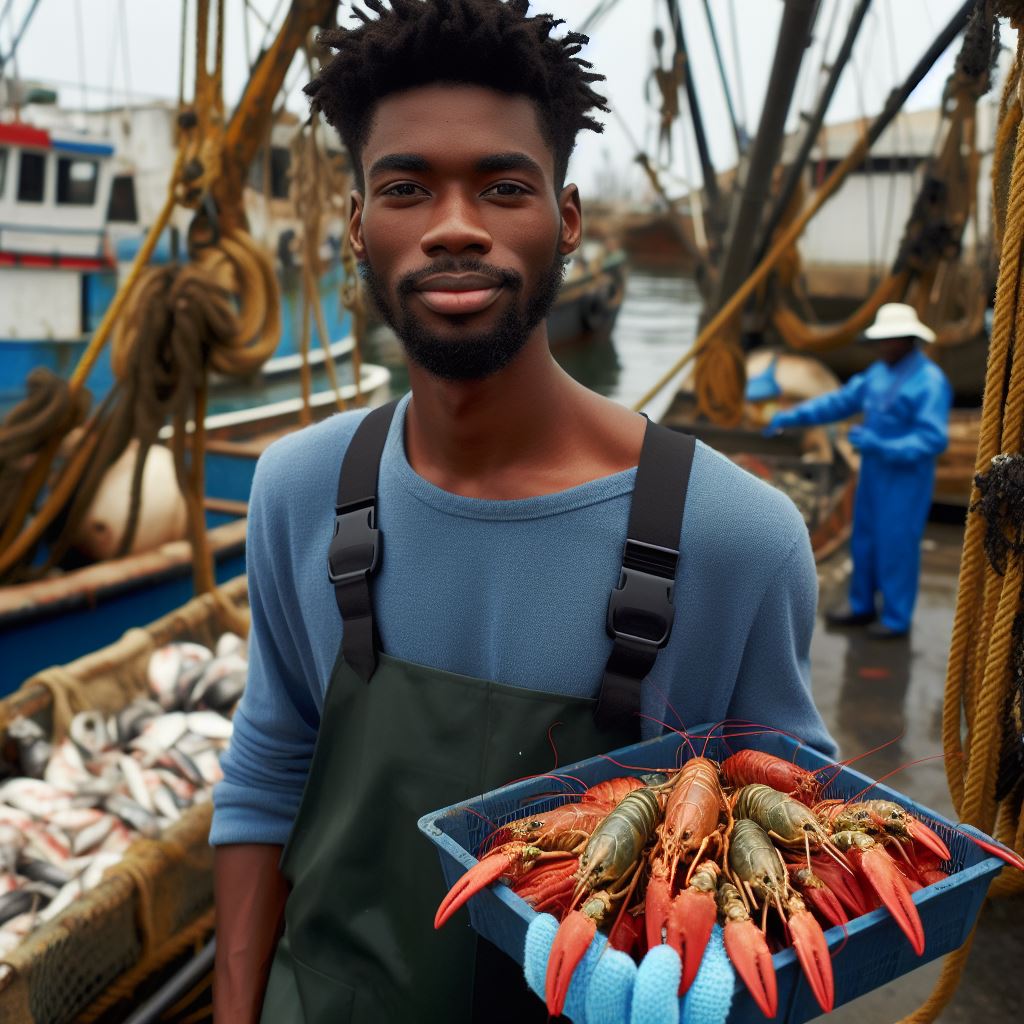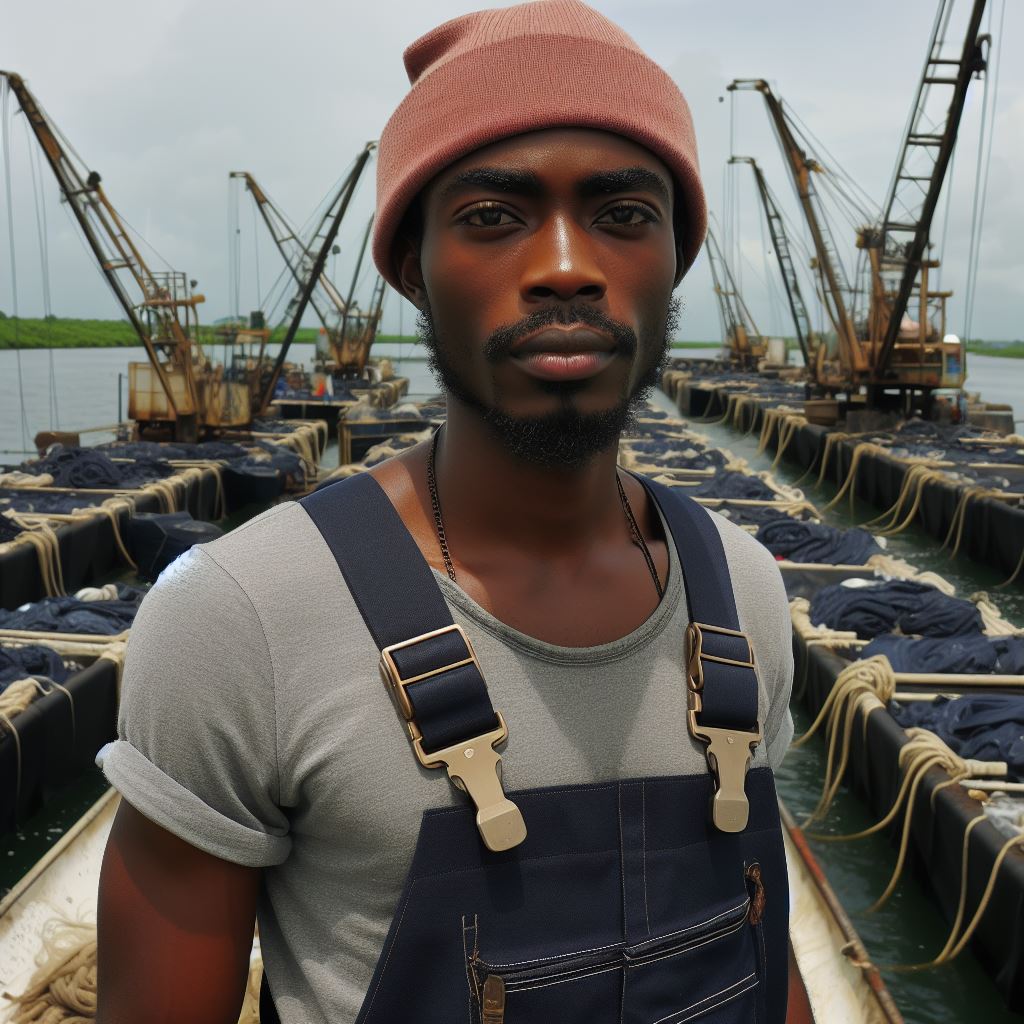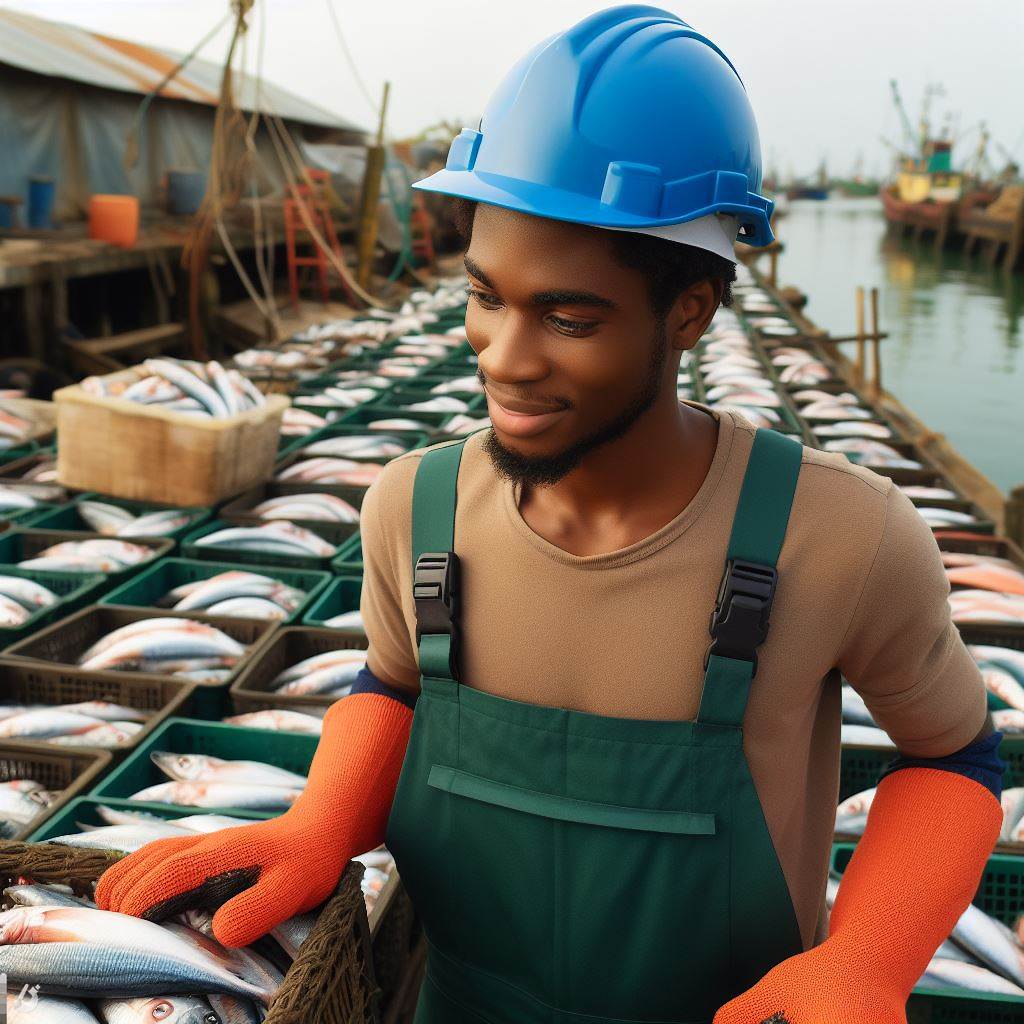Introduction
Fisheries students in Nigeria need to develop essential skills to thrive in the industry.
These skills are crucial in ensuring their success and contributing to the growth of the fisheries sector in Nigeria.
The field of Fisheries requires individuals with a diverse range of skills to effectively undertake various tasks.
Acquiring these skills is essential for students as they prepare to enter the workforce.
The Nigerian Fisheries sector is a significant contributor to both the economy and food security in the country.
It provides employment opportunities and contributes to the overall well-being of the population.
One key skill that every Nigerian Fisheries student must acquire is technical expertise.
This includes knowledge of fish biology, aquaculture techniques, and sustainable fishing practices.
Another crucial skill is strong communication abilities.
Students need to effectively communicate with colleagues, stakeholders, and fishery communities to promote cooperation and understanding.
Problem-solving skills are also important in the fisheries sector. Students must be equipped to analyze challenges and find innovative solutions to overcome them.
Entrepreneurial skills are becoming increasingly important as well. With the rising demand for fish products, students need to be able to identify market opportunities and develop sustainable business models.
Lastly, students must develop a strong work ethic and professionalism. The fisheries sector requires individuals who are dedicated, reliable, and committed to promoting sustainable practices.
Technical Skills
Knowledge of Fish Biology and Aquaculture
Fisheries students in Nigeria must acquire a range of technical skills to excel in their field.
These skills are essential for their academic and professional development, as well as contributing to sustainable fishery practices in the country.
A solid understanding of fish biology and aquaculture is fundamental for a fisheries student. This includes being able to identify different fish species and understand their habitats.
By studying fish anatomy, physiology, and reproduction, students gain valuable insights into the growth and development of fish populations.
Additionally, acquiring knowledge of aquaculture techniques like fish farming and breeding equips students with practical skills for sustainable fish production.
Fishing Techniques and Equipment Operation
Fishing techniques and equipment operation are equally important skills for Nigerian fisheries students.
Mastery of various fishing methods, such as using nets, traps, and hooks, allows students to adapt their approach depending on the target fish species and local conditions.
Understanding the functionality and maintenance of fishing equipment ensures that students can operate efficiently and safely in the field.
Furthermore, fisheries students must be well-versed in fishing regulations and sustainable practices.
This involves understanding the legal frameworks and restrictions that govern fishing activities in Nigeria.
By following these regulations, students contribute to the conservation and preservation of fish populations, ensuring their long-term sustainability.
In fact, acquiring technical skills is crucial for Nigerian fisheries students.
Having a comprehensive knowledge of fish biology and aquaculture enables students to understand the intricacies of fish populations and contribute to sustainable fish production.
Additionally, mastering fishing techniques and equipment operation allows students to adapt to different fishing scenarios and operate effectively.
Finally, being aware of fishing regulations and practicing sustainable fishing methods ensures the long-term preservation of Nigeria’s marine ecosystems.
Read: Role of Government in Promoting Fisheries Education
Data Collection and Analysis Skills
In addition to the fundamental theoretical knowledge and practical skills they acquire during their studies, fisheries students in Nigeria must develop certain key skills that will set them apart in the field.
These skills involve data collection and analysis, which play a crucial role in ensuring the health and sustainability of fish stocks and the overall marine ecosystem.
Fish Stock Assessment
To effectively assess fish stocks, fisheries students must be proficient in conducting surveys and collecting comprehensive data on fish populations.
This involves understanding the various sampling techniques used in the field and being able to apply statistical analysis to the collected data.
By doing so, students can accurately evaluate the health and sustainability of fish stocks, enabling them to make informed decisions regarding fishing practices and conservation efforts.
Environmental Monitoring
Environmental factors significantly impact fish populations, and fisheries students must possess a deep understanding of these influences.
They should be capable of conducting water quality assessments and ecological monitoring to gauge the health and well-being of the marine environment.
This involves interpreting and analyzing environmental data to identify any potential threats or changes that may affect fish populations.
By effectively monitoring the environment, students can contribute to the development of sustainable fishing practices and conservation strategies.
Acquiring these key skills in data collection and analysis is vital for Nigerian fisheries students as they play a critical role in managing and sustaining the country’s fish resources.
By employing these skills, students will be equipped with the necessary tools to make informed decisions in the face of changing environmental conditions and evolving fish populations.
Transform Your Career with Expert Guidance
Get personalized mentorship consulting that’s tailored to your unique path. Our expert advice is actionable and exclusive.
Get StartedThe ability to conduct surveys and collect comprehensive data enables students to obtain a holistic understanding of fish populations, facilitating proper stock assessment.
This, in turn, allows for decisions to be made regarding fishing quotas, habitat protection, and breeding strategies.
Additionally, the proficiency in sampling techniques and statistical analysis ensures that collected data is effectively interpreted and conclusions drawn from it are reliable and accurate.
Moreover, an in-depth comprehension of the impact of environmental factors on fish populations is crucial for developing sustainable fishing practices.
By monitoring and analyzing water quality and ecological data, fisheries students can identify potential threats such as pollution or habitat degradation, and take prompt action to mitigate these risks.
This proactive approach safeguards fish stocks and helps maintain the ecological balance of marine ecosystems.
In short, Nigerian fisheries students must acquire data collection and analysis skills to remain competitive in the field.
By possessing the ability to assess fish stocks and monitor environmental factors, they can contribute to sustainable fishing practices and ensure the long-term health of Nigeria’s marine resources.
These skills not only benefit the students themselves but also play a pivotal role in conservation efforts, fostering a sustainable and thriving fishing industry.
Read: Student Experiences: Life in a Nigerian Fisheries Faculty
Learn More: Field Trials and Their Importance in Plant Breeding
Management and Entrepreneurial Skills
In addition to technical skills, fisheries students in Nigeria must also acquire management and entrepreneurial skills to succeed in the industry.
These skills are essential for effective resource management and business development in the fisheries sector.
Fisheries Resource Management
A strong understanding of fisheries legislation, regulations, and policies is crucial for fisheries resource management.
Students need to be aware of the legal framework that governs the industry and stay updated on any changes or amendments.
This knowledge allows them to operate within the law and make informed decisions regarding resource conservation and sustainability.
The principles of fisheries conservation and sustainability are fundamental to ensuring the long-term viability of fish populations and the industry as a whole.
Students must grasp these principles and apply them in their management plans. This includes measures like setting catch limits, promoting responsible fishing practices, and protecting critical habitats.
Effective management plans are essential for the sustainable development of fisheries resources.
Students must learn how to develop comprehensive plans that address the specific needs and challenges of their fisheries.
These plans should consider factors such as population dynamics, ecosystem health, and stakeholder engagement. Implementation and monitoring of these plans are also critical for success.
Business Development and Marketing
Business development and marketing skills are vital for fisheries students looking to establish and grow their own ventures.
Understanding fish market analysis allows students to identify trends, demand patterns, and potential customers.
This information is crucial for making informed decisions about products, pricing, and market positioning.
The ability to develop marketing strategies specific to fish products is essential for successful business operations.
Students should learn how to promote their products effectively, attract customers, and differentiate themselves from competitors.
This involves understanding target markets, branding, advertising, and distribution channels.
Financial management and accounting principles are crucial for running a profitable fisheries business.
Students need to develop a strong understanding of financial concepts such as budgeting, cost analysis, and revenue forecasting.
This knowledge helps them make sound financial decisions, manage cash flow, and evaluate the financial health of their businesses.
In essence, acquiring management and entrepreneurial skills is vital for every Nigerian fisheries student.
These skills enable effective resource management, promote sustainable practices, and support successful business development.
By combining technical expertise with management proficiency, fisheries students can contribute to the growth and sustainability of the Nigerian fisheries industry.
Read: Research Innovations from Nigerian Fisheries Departments

Discover More: Innovative Plant Breeding Projects in Nigerian Universities
Communication and Collaboration Skills
Effective Communication
Effective communication is a crucial skill for every Nigerian fisheries student. It encompasses the ability to communicate effectively with various stakeholders, colleagues, and customers in the field.
As a fisheries student, you will often interact and engage with different individuals, ranging from local community members to policymakers and industry experts.
Therefore, having strong communication skills is essential to convey important information, discuss fisheries matters, and establish effective relationships with others.
Proficiency in both written and verbal communication is vital for a successful career in fisheries.
Strong written communication skills enable you to prepare well-structured reports, research papers, and proposals.
It allows you to present data and findings accurately, making your work more credible and impactful.
Verbal communication, on the other hand, helps you express your ideas, thoughts, and opinions clearly and confidently during meetings, presentations, and discussions.
Effective verbal communication is crucial to handle questions, engage in productive conversations, and deliver persuasive arguments.
Active listening skills are equally important for effective communication.
Listening attentively to stakeholders, colleagues, and customers demonstrates your respect and interest in their perspectives and concerns.
It enables you to understand their needs, expectations, and feedback, fostering better collaboration and effective problem-solving.
Furthermore, active listening promotes effective interpersonal relationships, building trust and rapport within the fisheries community.
Collaboration and Teamwork
Collaboration and teamwork are vital for fisheries students to navigate the dynamic and complex nature of the industry.
As a fisheries professional, you will often find yourself working in multidisciplinary teams, comprising individuals from diverse backgrounds, such as biologists, economists, and policymakers.
The ability to work effectively in such teams is crucial to integrate different perspectives, skills, and knowledge to address complex fisheries issues.
Collaboration enables the pooling of resources, expertise, and experiences, leading to innovative solutions and more sustainable practices.
Cooperation and collaboration with fellow fisheries professionals, scientists, and policymakers are essential for the growth and development of the fisheries sector in Nigeria.
By working together, sharing insights, and exchanging knowledge, fisheries students can contribute to the collective efforts aimed at improving fisheries management, conservation, and sustainability.
Collaborative initiatives also facilitate the development and implementation of evidence-based policies and practices that address the challenges faced by the industry.
Participation in community engagement activities related to fisheries is another important aspect of collaboration.
It allows you to actively interact with local communities, fisherfolk, and other stakeholders, fostering dialogue, understanding, and support for fisheries-related initiatives.
Community engagement activities can involve awareness campaigns, training workshops, and participatory decision-making processes.
By engaging with communities, you can gain valuable insights into their needs, perspectives, and traditional knowledge, which can contribute to more inclusive and sustainable fisheries practices.
In summary, communication and collaboration skills are crucial for every Nigerian fisheries student.
Effective communication, with proficiency in written and verbal skills, active listening, and interpersonal abilities, enables you to interact successfully with stakeholders, colleagues, and customers.
Collaboration and teamwork skills help you work harmoniously in multidisciplinary teams and foster cooperation with fellow professionals, scientists, and policymakers.
Active participation in community engagement activities further promotes collaboration, understanding, and support within the fisheries sector.
Developing and honing these skills will significantly contribute to your success as a fisheries student and future professional.
Read: Scholarships and Funding for Fisheries Students in Nigeria
Uncover the Details: Pasture and Range Management Research Centers in Nigeria
Conclusion
The acquisition of key skills is crucial for Nigerian Fisheries students.
It empowers them with the necessary knowledge and expertise to excel in their chosen field.
By acquiring these skills, students can contribute to the sustainable growth of the Nigerian Fisheries sector.
It is important for students to recognize the importance of continuous learning and seek additional training opportunities.
Additional training and professional development can enhance their skills and make them more marketable in the industry.
Therefore, I encourage students to actively seek out these opportunities to further expand their skill set.
Lastly, as students acquire these skills, it is important for them to apply what they have learned.
They should actively contribute to the development and advancement of the Nigerian Fisheries sector.
By doing so, they will not only benefit themselves but also contribute to the overall sustainable growth of the sector.
In the end, it is essential for Nigerian Fisheries students to acquire these key skills and use them to make a positive impact.
Together, we can work towards a thriving and sustainable Nigerian Fisheries sector.
Join us and be part of the change!




